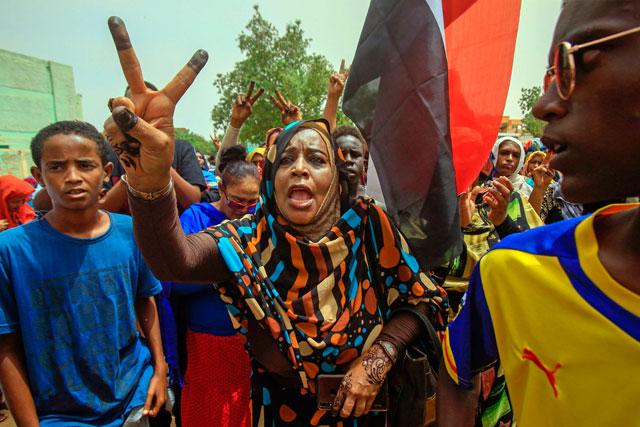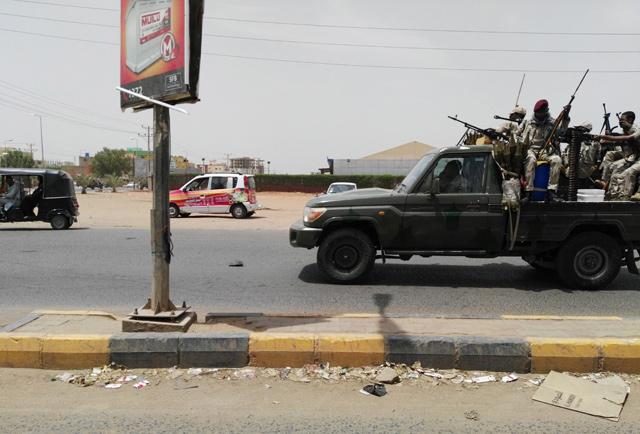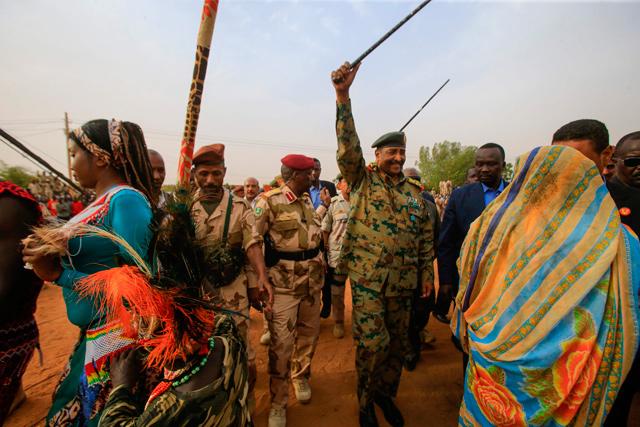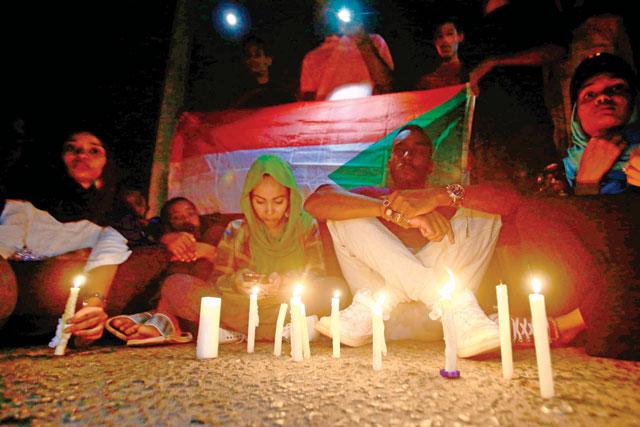You are here
Mass protests for civilian rule rock Sudan
By AFP - Jul 01,2019 - Last updated at Jul 01,2019

Sudanese protesters flash the V-sign during a mass demonstration against Sudan's ruling generals in Khartoum on Sunday (AFP photo)
KHARTOUM — Tens of thousands of protesters rallied across Sudan on Sunday against the ruling generals as demonstrators marched on the presidential palace in Khartoum, in the biggest mass demonstration since a deadly crackdown on demonstrators.
The "million-man" march is seen as a test for protest organisers whose push for civilian rule has been hit by the June 3 raid on a Khartoum sit-in and a subsequent internet blackout that has curbed their ability to mobilise support.
Dozens of demonstrators were killed and hundreds wounded when armed men in military fatigues stormed the sit-in outside army headquarters, shooting and beating protesters who had camped there since April 6.
On Sunday, police fired several rounds of tear gas on crowds approaching the presidential palace after organisers called for a march on the building that houses offices of the ruling transitional military council, an AFP correspondent reported.
"We call on our revolutionary people in the capital to go to the republican palace... to seek justice for the martyrs and for an unconditional transfer of power to civilians," the Sudanese Professionals Association that first launched protests against now ousted ruler Omar Al Bashir said on Twitter.
Police also fired tear gas at protesters in the northern Khartoum district of Bahri and in Mamura and Arkweit, in the capital's east, as thousands of protesters chanted "Civilian rule! Civilian rule!", witnesses said.
Elsewhere, security forces used tear gas to disperse protests in the capital's twin city of Omdurman and the eastern town of Gadaref.
The latest demonstrations come at a time when Ethiopia and the African Union (AU) are jointly mediating between the protesters and generals.
The European Union, several Western nations and rights groups called on the generals to avoid any violence.
Men and women flashing victory signs and carrying Sudanese flags flooded the streets of Al Sahafa neighbourhood of Khartoum.
“We are here for the martyrs of the [June 3] sit-in. We want a civilian state that guarantees our freedom. We want to get rid of military dictatorship,” said Zeinab, 23, as onlookers cheered and motorists honked horns.
“No one gave a mandate to the military council, all the people are against the council,” said another protester who shouted out: “I’m the next martyr.”
Marchers also passed by the homes of those killed on June 3.
Others chanting “Blood for blood, we don’t want compensation” took to the streets of the Jabra district, while rallies were also under way in other neighbourhoods of the capital.
On the road to airport, security forces moved to block off crowds of demonstrators, an AFP correspondent reported.
Thousands also protested in the cities of Port Sudan, Al Obied, Madani and Khasma El Girba, witnesses said.
Crackdown feared
The feared paramilitary Rapid Support Forces (RSF) were deployed in pick-up trucks mounted with machineguns in several Khartoum squares and many shops stayed shut.
RSF chief Gen. Mohamed Hamdan Dagalo had warned he would not tolerate any “vandalism” at the protests.
“There are vandals, there are people who have an agenda, a hidden agenda, we don’t want problems,” Dagalo, who is also the ruling military council’s deputy chief, said on Saturday.
In the run-up to the protest many Sudanese said they feared new violence.
“I expect large numbers... and it’s very possible that security forces will use force,” said Mustafa, 25.
Another demonstrator, Talal, 29, said: “Even if only a few rallies take place in Khartoum, they will break the barrier of fear and more people will take to the streets” in coming days.
About 130 people have been killed since the crackdown, the majority of them on that day, according to doctors close to the alliance.
The health ministry says 61 people died nationwide on June 3.
The military council insists it did not order the dispersal of the sit-in, but acknowledged “excesses” after orders were given to purge a nearby area allegedly notorious for drug peddling.
The council has warned it would hold the alliance “entirely responsible if any soul is lost” in Sunday’s protests.
‘World is watching’
Tensions remain high since the June 3 raid, which followed the collapse of talks over who should lead a new governing body — a civilian or soldier.
Ethiopia and the AU have proposed a blueprint for a civilian-majority body, which the generals say could be a basis for resuming talks.
Protesters had initially gathered at the military headquarters to seek the army’s support in ousting Bashir.
They kept up their sit-in to demand civilian rule after the generals deposed the president on April 11.
Demonstrators’ “right to peacefully protest and express their views on 30 June, or on any other date, remains key”, the European Union said.
Amnesty International’s Secretary General Kumi Naidoo said the military council “must not allow the country to slide back into yet more repression”.
“The world is watching.”
Related Articles
KHARTOUM — The deadly crackdown by security forces on protesters in Sudan follows a building standoff between the ruling military and demons
KHARTOUM — A top Sudanese general warned on Saturday that he will not tolerate any vandalism at a planned mass protest, even as army rulers
KHARTOUM — Members of a feared Sudanese paramilitary force shot dead a civilian on Sunday in a town southeast of the capital as angry reside














